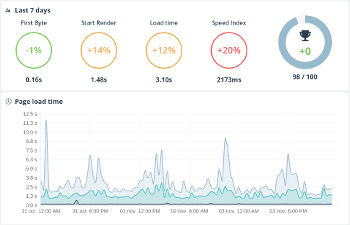Introducton:
In today's digital age, website speed plays a crucial role in the success of any online business. With impatient users and search engines constantly evaluating website performance, it's essential to have a fast-loading website to keep visitors engaged and boost your search engine rankings. To assess the speed and performance of your website, you need a reliable tool that provides accurate results. In this article, we will explore the benefits of using a website speed test tool, how it works, and recommend some popular options in the market.
Why Is Website Speed Important?
Before diving into the specifics of website speed testing, it's crucial to understand why website speed is of utmost importance. In a fast-paced world where time is precious, users expect websites to load almost instantly. Statistics show that a staggering 40% of users abandon a website that takes more than three seconds to load. Moreover, search engines like Google consider website speed as one of the ranking factors, impacting your visibility and organic traffic.
Benefits of Using a Website Speed Test Tool
Identify Performance Bottlenecks: A robust website speed test tool helps you identify the exact elements on your website that are causing slow loading times. It will analyze all the necessary components, including image sizes, code optimization, and server response time.
Improve User Experience: By pinpointing the performance bottlenecks, you can effectively optimize your website to improve the overall user experience. Users are more likely to engage, convert, and return to a website that loads quickly and smoothly.
Boost SEO Rankings: As mentioned earlier, search engines like Google consider website speed as a ranking factor. By utilizing a website speed test tool and optimizing your website accordingly, you can enhance your chances of ranking higher in search engine result pages (SERPs).
Stay Ahead of Competitors: In a highly competitive digital landscape, having a faster loading website can set you apart from your competitors. Users are more likely to choose and trust a website that is optimized for speed and delivers a seamless browsing experience.
How Does a Website Speed Test Tool Work?
Website speed test tools employ various techniques to analyze the performance of your website. Generally, they simulate a visit to your website from a server and measure the time taken to load various elements. Some of the common metrics that these tools measure include:
Page Load Time: This metric represents the time it takes for your website to fully load and appear on the user's screen. A quick loading time ensures a positive user experience.
Time to First Byte (TTFB): TTFB refers to the time taken by a user's browser to receive the first byte of information from the server. A lower TTFB indicates faster server response time.
Render Start Time: It shows when the browser starts rendering the website content. A lower render start time implies that the website is optimized, and users can start interacting with it sooner.
Popular Website Speed Test Tools
Now that we recognize the importance and mechanics of website speed tests, let us explore some popular tools available today:
GTmetrix:
GTmetrix is a free website's speed test tool that offers detailed analytics and performance insights. It provides waterfall charts, PageSpeed and YSlow scores, and recommendations for improvement.








